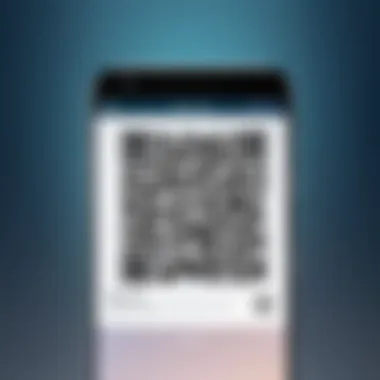Top Safe QR Code Scanners for Android Users


Intro
In today's mobile-driven world, QR codes play an essential role in facilitating convenient access to information. From scanning product details in stores to accessing digital content, the need for reliable and safe QR code scanners is paramount. This article explores the best QR code scanning applications available for Android, with a strong emphasis on security and functionality.
Users, especially those who value technology, must choose applications that not only meet their needs but also protect their personal data. The piece will compare several leading QR code scanners, emphasizing their unique features, user ratings, and overall performance. Additionally, we will delve into the technology that underpins QR codes, offering guidelines for users to ensure safe scanning practices.
Prologue to QR Codes
QR codes have become integral in our digital landscape. Their capability to bridge the physical world with the digital one makes them vital. This section will cover the foundational understanding of QR codes, how they function, and why you should consider using a QR code scanner to enhance your tech experience.
Definition and Use Cases
A QR code, or Quick Response code, is a two-dimensional barcode. It has a unique design that can be scanned by smartphones. It can quickly direct users to websites, initiate downloads, or authenticate information. Common use cases of QR codes include product packaging, marketing materials, events, and ticketing. Businesses utilize them for promotions and customer engagement.
For example, a restaurant may display a QR code on its menu. Patrons can scan it to access an online menu or order food directly from their phone. Additionally, QR codes are crucial in contactless payments, which have increased in popularity, especially during the pandemic. Thus, understanding what QR codes are and how they enhance interactions in various settings is essential in today’s tech-driven society.
Emergence of QR Codes in Modern Technology
QR codes were first developed in the 1990s by Denso Wave. Their primary purpose was to track automotive parts. Over time, their application has exploded. With the rise of smartphones, QR codes gained traction. They became a viable tool for consumers and businesses alike.
The COVID-19 pandemic accelerated this trend. Many businesses shifted towards contactless solutions. QR codes allow for a seamless user experience without physical interaction. From menus to payments, they offer convenience and efficiency. Moreover, they are user-friendly and accessible. The technology behind them has improved, providing faster scanning capabilities and more robust security features.
Importance of QR Code Scanners
In today's digital environment, QR code scanners hold considerable significance. They have transformed how we access information and interact with the world around us. As our dependency on mobile technology grows, understanding the importance of QR code scanners has become crucial. They facilitate quick connections to websites, applications, or additional content without needing tedious typing or searching. This seamless interaction saves time and enhances efficiency.
Facilitating Instant Access to Information
QR code scanners provide immediate access to information. A simple scan connects a user to a wealth of details with minimal effort. For instance, users can gain access to coupons, product details, or event tickets without entering URLs. This convenience caters to our fast-paced lives where time is valuable. Businesses benefit from this instantaneous access as well, streamlining customer engagement and promoting sales. The ability to scan a code and receive relevant information enhances decision-making, making it a valuable tool for consumers and businesses alike.
Enhancing User Experience
A well-designed QR code scanner enhances the overall user experience. Features like intuitive interfaces and quick scanning add to user satisfaction. When a scanner functions effectively and reliably, it fosters trust among users. They are more likely to use the scanner regularly, reinforcing its utility.
Moreover, various custom features available in many top applications make scanning a breeze. Some scanners incorporate additional functionalities such as history tracking and integrated sharing options, which further enhance usability.
"The integration of QR code scanners into everyday tasks elevates the user experience substantially, offering both efficiency and practicality."
The value of QR code scanners lies not just in functionality but in how they integrate into users' lifestyles. A scanner that reduces barriers to information access can significantly improve consumer engagement and satisfaction with products and services. As mobile technology continues to evolve, the role of QR code scanners will likely become even more significant in facilitating communication and access to information.
Security Concerns with QR Code Scanning
As QR codes become an integral part of daily activities, understanding the security concerns related to their scanning is essential. The convenience QR codes offer also comes with certain risks, making it important to educate users on potential pitfalls. In this section, we will explore various risks involved with unsafe scanning practices and provide strategies to enhance safety during the use of QR code scanners.
Potential Risks of Unsafe Scanning
When scanning QR codes, users often trust them without questioning their origin or content. This blind trust can open the door to various security issues. Here are some notable risks:
- Malicious Links: Scanning a QR code may lead users to harmful websites, which can install malware or steal personal information.
- Phishing Attacks: Some QR codes redirect users to sites that mimic legitimate services, tricking them into providing sensitive details.
- Data Breaches: Unscrupulous entities can exploit QR codes to access users’ personal data, especially when used on public Wi-Fi.
- Financial Scams: Users can unwittingly expose themselves to scams involving payments or donations by scanning fraudulent QR codes.


Reports suggest that fraudulent QR codes have become a popular tool for cybercriminals, especially during events where quick access to information is necessary, such as tickets or promotions. The ease of creating QR codes contributes to their misuse. It is imperative for users to remain vigilant.
Strategies for Safe Scanning Practices
Preventing security breaches begins with awareness and diligence. Below are strategies to ensure safer scanning practices:
- Verify the Source: Always check the credibility of the entity providing the QR code. Stick to codes from trusted sources or companies you are familiar with.
- Preview Links: Use QR scanners that allow you to preview the URL before opening it in a browser. This way, you can check for any signs of phishing.
- Avoid Scanning Unknown Codes: Do not scan QR codes from strangers or those posted in public spaces. If a code seems suspicious, avoid it completely.
- Regularly Update Apps: Keep your QR code scanning application updated. Developers often patch security vulnerabilities, making regular updates critical.
- Use Security Features: Some scanners offer built-in protection features that can detect malicious links or warn against unsafe content. Ensure your chosen app has these protections.
"The key to safe scanning lies in vigilance. Trust in technology must be balanced with precaution."
By adhering to these strategies, users can better protect themselves from the potential risks associated with QR code scanning. The security landscape is continually evolving, and so should the approaches users take toward technology. Understanding risks and practicing safe scanning can ensure a secure user experience in a world increasingly reliant on QR codes.
Key Features to Look for in a QR Code Scanner
When selecting a QR code scanner for Android, understanding the key features is crucial. The right scanner can significantly enhance your user experience and ensure safety while accessing information. This article carefully outlines the core features to consider when choosing a QR code scanner.
User-Friendly Interface
A user-friendly interface is essential for effective QR code scanning. People often prefer apps that they can navigate easily without extensive tutorials. This feature is especially important for a tech-savvy audience, who may want efficiency in their scanning process. A clean and intuitive layout allows users to quickly access the scanning function.
An app with visual clarity and responsive design reduces friction during use. Features such as customizable display options can improve interaction as well. Therefore, ensure the app allows personal adjustments to suit your preferences.
Speed and Accuracy of Scanning
Speed and accuracy are paramount. Users tend to favor apps that deliver results promptly. Long wait times can be frustrating, leading many to abandon the app altogether. A good QR code scanner should reliably decode various QR codes without excessive delays, providing instant access to critical information.
Furthermore, accuracy in scanning can prevent errors. Inaccurate scans may lead to misleading or harmful content. Therefore, opt for scanners that deploy advanced algorithms capable of reading codes correctly in different lighting conditions and distances. Having this capability is essential for overall satisfaction and safety.
Integration with Other Apps
The ability to integrate with other applications enhances the functionality of a QR code scanner. Applications that can interact seamlessly with popular platforms, such as Google Maps or social media, offer added convenience. This means users can engage directly with content without switching between multiple apps.
Integrations also allow users to save scanned information in a structured manner. Features such as exporting scanned data to note-taking apps or bookmarking for later reference can elevate the scanning experience. Therefore, compatibility with other tools becomes a valuable asset in the selection process.
Top QR Code Scanners for Android
The selection of a QR code scanner is an essential aspect of utilizing QR codes effectively on Android devices. A good QR code scanner not only reads codes quickly but also ensures a secure experience for the user. Given the rise of QR code usage for various purposes, including payments and access to information, identifying the top scanners is crucial.
Quality scanners improve the efficiency of transactions. They help users avoid potentially harmful links and enhance digital interactions. This article highlights specific applications that stand out in terms of security and functionality, providing a deep dive into their features and user feedback.
App A
Overview
App A is recognized for its intuitive interface and reliable performance. This app uses advanced scanning technology to read QR codes quickly. A notable feature is its ability to scan various types of codes, such as URLs and contact information. This versatility makes it a beneficial choice for users who depend on multiple functionalities. However, despite its strengths, some users might find the app's design a bit simplistic compared to others on the market.
Key Features
One of the defining aspects of App A is its speed. It offers quick scanning that minimizes wait times, which is vital in busy environments. Additionally, the app includes a history log, allowing users to revisit previous scans. This can be advantageous for those who need to keep track of their scanned items. A disadvantage might be its lack of additional features like built-in payment options that some other apps offer.


User Ratings
User ratings for App A are generally positive, highlighting its ease of use and reliability. Most users appreciate the straightforward approach to scanning features. However, a small subset expresses dissatisfaction due to the absence of more advanced functionalities. This feedback indicates that while App A is good for basic needs, it may not satisfy those looking for comprehensive features.
App B
Overview
App B stands out due to its comprehensive security features. This application performs thorough checks on links before directing users, significantly reducing the risk of phishing. It also includes multi-language support, making it accessible for international users. On the downside, some individuals might feel overwhelmed by its extensive options, especially if seeking simplicity.
Key Features
Among its important features, App B offers real-time scanning alerts. This alerts users if a scanned QR code may pose a security risk. Such proactive measures enhance user safety considerably. Nonetheless, users may find the alert system a bit overly cautious, leading to false positives that can interrupt regular use.
User Ratings
App B tends to garner high praise for its security measures. Users commend this app's thorough checks before leading them to links. However, there are some complaints regarding the complexity of the interface, which can be a barrier for less tech-savvy individuals. Overall, the app is appreciated by users who prioritize security over simplicity.
App
Overview
App C is celebrated for its user-friendly design and advanced analytics features. It provides users with detailed information about each scanned code, including data on how often a QR code is scanned. This can be particularly useful for businesses tracking engagement with QR codes. On the other hand, the extensive analytics features can overwhelm casual users who are not interested in such depth.
Key Features
A standout characteristic of App C is its social sharing functionality. This allows users to share scanned links directly from the app. The ease of sharing can be enjoyed by marketers and social media enthusiasts alike. However, not all users may find this feature relevant to their needs, potentially complicating the app's interface for them.
User Ratings
User feedback for App C often emphasizes its rich feature set and ease of navigation. Users appreciate its design, which balances functionality with usability. Nonetheless, a few have pointed out that the additional analytics features, while beneficial, might not be necessary for everyday use. This indicates a divide in the target audience's needs, from casual users to data-driven professionals.
Comparison of Features
When selecting a QR code scanner, it's worthwhile to compare the core features of these top apps. App A excels in speed and straightforward use. App B focuses on security, minimizing risks associated with QR code scanning. Meanwhile, App C provides analytics for users interested in deeper insights. By analyzing these apps side by side, users can determine which aligns best with their needs and preferences.
Evaluating User Feedback and Reviews
In the realm of mobile applications, user feedback plays a critical role in determining the effectiveness and reliability of QR code scanners. Evaluating user feedback and reviews provides insight into real-world experiences, which often reveal more than marketed features suggest. The significance of this evaluation is particularly relevant for tech-savvy individuals, who prioritize safety and efficiency when selecting a QR code scanning solution.
User feedback encompasses a variety of aspects such as usability, speeds of scanning, and the ability to handle different QR code types. These elements not only highlight the app's strengths but also bring light into its weaknesses. In addition, frequent updates from developers can be gauged through user comments. Therefore, this analysis serves as an essential metric in assessing the long-term viability of an application.
Another important benefit of analyzing reviews is the identification of overall user sentiment. Positive reviews can signal a dependable and effective tool, while negative feedback might indicate shortfalls in functionality or security. The insights gained from this feedback can guide consumers in making informed decisions and ultimately, optimizing their QR code scanning experience.
Analysis of User Experiences
Delving into user experiences provides an enlightening view of how QR code scanners perform in day-to-day scenarios. Customers often share their personal stories about how a particular app has improved their productivity or facilitated seamless transactions. For instance, users have noted that certain applications like QR Code Reader have user-friendly interfaces, allowing them to scan codes almost instantaneously.
Moreover, feedback can reveal how well these applications handle various QR code formats. Some scanners may excel in reading URL-based codes but struggle with text or contact information codes. By examining these experiences, potential users can better understand the app’s capabilities.


User Experience Highlights:
- Quick Scanning: Many users appreciate scanners that reduce lag time between scanning and result retrieval.
- Ease of Use: Simple interfaces are frequently mentioned as a desirable feature, as they cater to users who may not be tech-savvy.
- Updates and Bug Fixes: Regular updates from developers are often appreciated and can indicate a commitment to product improvement.
Common Complaints and Positive Feedback
Common feedback, both positive and negative, often revolves around key functionalities and user expectations. Positive feedback generally emphasizes features such as speed, security measures, and reliability. For instance, users praise the Kaspersky QR Scanner not just for its quick responses, but also for the integrated security features that scan links for potential threats, which addresses security concerns discussed earlier.
Conversely, common complaints may highlight issues such as slow processing time, inaccuracies in scanning, and lack of certain functionalities. Some users have reported dissatisfaction with applications that falter in reading intricate or damaged QR codes, leading to frustration.
Key Complaints Include:
- Inaccuracy: Some applications may struggle with less standard QR codes.
- Ads in Free Versions: Users frequently complain about intrusive ads when using the free versions of apps, detracting from the overall experience.
- Limited Features: Users desire more integrated functionalities, like direct app launch from scanned codes.
Through a thorough analysis of these user experiences and feedback, potential users can ascertain the most suitable QR code scanner that aligns with their preferences and requirements. Engaging with real-user insights empowers tech enthusiasts to navigate their options wisely.
Future of QR Code Scanning Technology
The outlook for QR code scanning technology is intrinsically linked to advancements in mobile device capabilities and user expectations. As the digital landscape evolves, the importance of QR codes increases. They serve as a bridge between the physical and digital realms. Many businesses and consumers are realizing the potential of QR codes in enhancing user interaction and providing quick access to information. This makes understanding the future trajectory of QR code scanning essential, especially for those selecting a safe and efficient scanner for their devices.
Optimized scanning capabilities, along with safety features, will likely define future developments. Security issues, which are currently a concern, will also see improvements as developers prioritize user protection. This article sheds light on the innovations on the horizon and the expanding role of QR codes in the digital marketing space.
Innovations on the Horizon
Emerging technologies promise to enhance the functionality of QR code scanners. Key innovations include:
- Augmented Reality Integration: Users may soon experience augmented reality features where scanning a QR code not only leads to information but enriches it with 3D visuals or animations. This could transform static information into interactive experiences.
- Improved Safety Protocols: Developers are focusing on incorporating advanced security features within the scanning apps. Expect to see enhanced verification processes that can confirm the authenticity of the scanned codes before redirecting users to external links.
- Increased Applications in Various Fields: Industries like retail and healthcare are looking to integrate QR codes more effectively. This means users will benefit from more contextual interactions, such as product information through a scan in a retail store or health information while visiting a clinic.
"The future of QR code technology is not merely about functionality. It's about creating a safer, more intuitive experience for every user."
The Role of QR Codes in Digital Marketing
Digital marketing is rapidly adapting to new technologies, and QR codes are becoming a staple in many strategies. Their capacity to connect offline and online experiences provides unique benefits for marketers. QR codes facilitate instant engagement, acting as a direct link to content, promotional offers, or even social media platforms.
Considerations for marketers include:
- Enhanced Customer Engagement: QR codes can trigger immediate responses. When placed on product packaging or advertising materials, they encourage consumers to interact with brands in real-time.
- Tracking and Analytics: Marketers can utilize QR codes to track user engagement and behavior. This data can be pivotal in refining future marketing campaigns and understanding consumer preferences better.
- Cost-Effective Promotions: Integrating QR codes into campaigns often requires minimal investment yet can yield significant returns. This is especially true when targeting tech-savvy audiences who appreciate quick and efficient access to information.
The future of QR codes in digital marketing not only signifies an evolution in technology but also represents an ongoing dialogue between consumers and brands. Understanding these dynamics helps users make informed choices about scanning applications, ensuring a safer and more effective digital experience.
Culmination
In this article, we have examined the intricacies surrounding the selection of optimal QR code scanners for Android devices. Understanding which applications best prioritize safety and functionality is crucial in today’s mobile-centric world. QR codes serve as an essential bridge to information, making their reliable scanning not just convenient, but necessary.
Recap of Key Points
- Importance of Security: We explored the security risks associated with QR codes, including potential phishing attacks and malware. Hence, a trustworthy scanner is fundamental to safeguard personal data.
- User Experience: A user-friendly interface and seamless integration with other apps enhance the overall experience of scanning QR codes. Scanners that offer speed and accuracy were identified as essential attributes.
- Application Comparisons: We analyzed several applications, highlighting their unique features and user ratings. This comparative approach provided insights on which apps stand out in terms of reliability and performance.
Final Recommendations for QR Code Scanners
When selecting a QR code scanner, consider these recommendations:
- Look for Trusted Apps: Check user reviews and ratings. Applications like Kaspersky QR Scanner and QR Code Reader are reputed for their security measures.
- Check for Updates: Frequent updates indicate that the app developers are committed to addressing security concerns and improving functionality.
- Utilize Built-in Scanners: Some smartphones come with built-in QR scanners within their camera apps. This can minimize reliance on third-party applications, reducing exposure to potential threats.
- Test Functionality: Before fully committing to an app, try scanning various types of codes to assess its accuracy and speed.
By keeping these factors in mind, users can make informed choices, ensuring that their QR code scanning experience is both safe and efficient.







